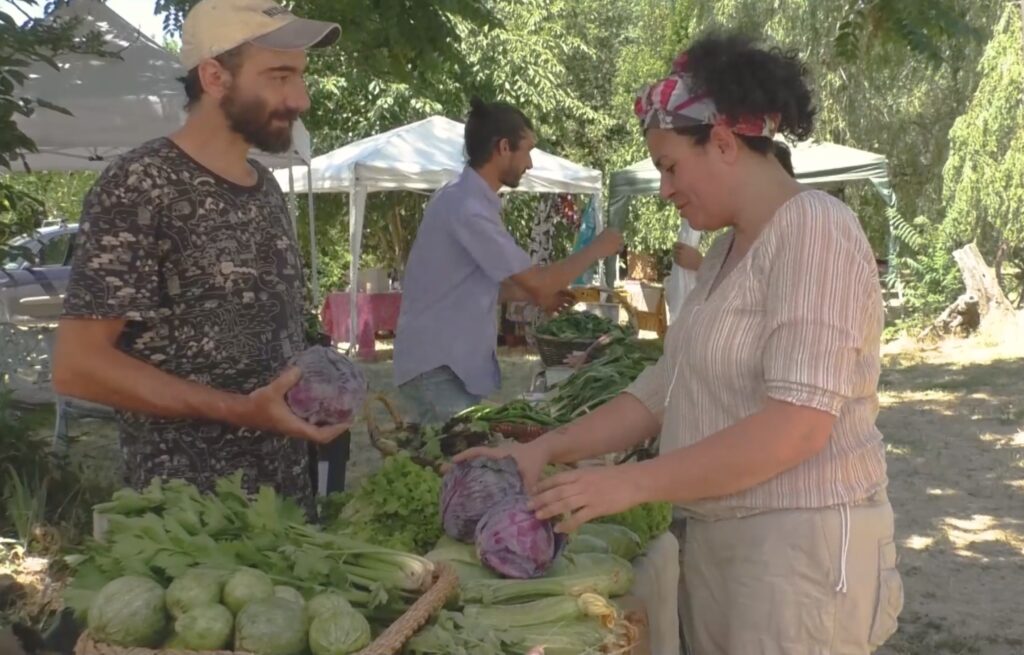The team of the “Peasant Activism Project” has realised two different ethnographic documentaries in collaboration with activists, small-scale farmers and consumers: “De-commodifying Foodways” (86 min.) and “An Experimental Path” (37 min.). The last film is conceptualized specifically for debate and screening sessions, while the first one offers an in-depth look into daily life, joys and challenges of small-scale farmers and their activist networks. Both documentaries have been presented and discusses both in Italy and internationally, as well as in a number of film festival’s specialised in Visual Anthropology.
Please contact us if you would like to organize a screening or view the films (info@peasantproject.org).
The Border. Resisting Monocultures in Central Italy
Third documentary of the Peasant Activism Project
(40′, 2024, Italy)
A new border divides the rural peripheries of central Italy, a border between those seeking to safeguard a varied agricultural landscape and those hoping for easy money. According to the “Italy Hazelnut Plan”, 20,000 hectares of new hazelnut plantations are planned in central Italy alone, but the globalization of the agricultural model based on large monocultures represents a problem of global dimensions and is described by Donna Haraway and Anna L. Tsing as “plantationocene”, accelerating climate change, impoverishes local economic fabrics and pollutes soils and aquifers. The documentary portrays a group of people trying to resist the multiple effects of monocrops, building alternative economies and buying land to remove them from the sphere of influence of multinational companies.

De-Commodifying Foodways
Second documentary of the Peasant Activism Project
(86’, 2018, Italy)
How proceeds the daily life of those who have taken the step to realize their dream to life in the countryside? This documentary offers an ethnographic eye on the joys, perils and challenges of those who life from sustainable agriculture and food production. Diving deep into the everyday rhythm of a couple of goat keepers, a collective of cheesemakers, a Marxist-inspired beekeeper and an herbal expert, the documentary takes the viewer on a journey through the difficulties of producing and selling products, loneliness and nature, unknown circuits of alternative micro-economies, as well as the incisiveness of contemporary neo-peasant activism as a source of inspiration.
An Experimental Path
First documentary of the Peasant Activism Project
(40’, 2016, Italy)
A network of independent small-scale farmers and food producers of Central Italy experiments with the “participatory guarantee”, a set of collective and participatory practices that aims to develop an alternative food quality and safety certification. The documentary displays everyday practices and urban-rural relations that constitute the basis of this alternative certification.
As an often-overseen form of “peasant resistance”, the experiment with alternative certifications aims to offer innovative solutions to challenges of food processing at small scales, organic quality standards and the need to prevent black and precarious work conditions.
At the core of the film stands a collective visit for the “participatory guarantee”, while a maker of essential oils, cattle breeders, beekeepers and a baker discuss and demonstrate how through this processual practice it becomes possible to build innovative networks between peasants and co-producers, and to generate alternative economical circuits and food certifications.
Inscribed in the rhythms of the Italian countryside and the efforts to establish a network of new social relations, the protagonists address the difficulties of keeping alive and autonomous an economic and political circuit through local markets, direct food distribution and participation in national peasant movements. Challenging the system of standardized regulations in agriculture and food processing – which favours large agribusiness – the experimental path of the “participatory guarantee” is a work in progress, highlighting to other farmers, food processors and “co-producers” of the network the possibilities of a different scale of values related to the organic-ness of food and to the mainstream work ethic in the countryside. The objective of the “participatory guarantee” is to build personal relationships of trust through shared visits and the establishment of autonomous food supply chain.
In sum, the documentary raises important questions not only with regard to the management of food safety and how we produce and source food, but also with regard to the politics of transparency and trust.
Please find below a trailer of the documentary
